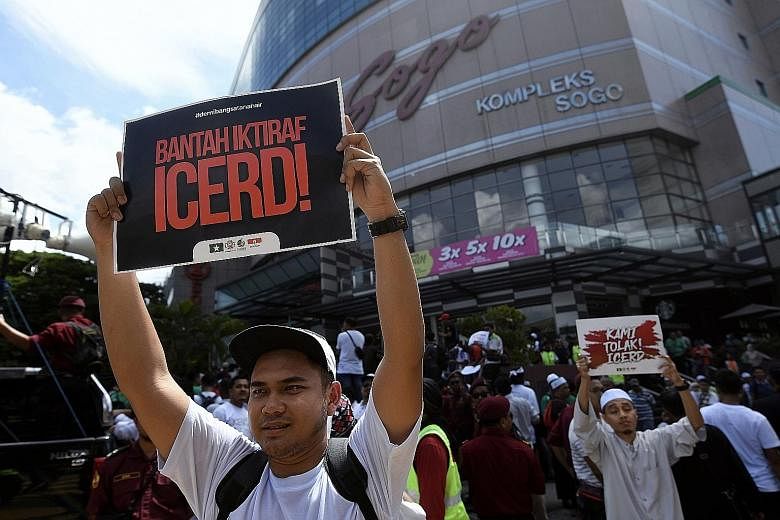KUALA LUMPUR • The Malaysian government yesterday declared it will not ratify a United Nations human rights treaty, after facing anger from Malay and Muslim organisations worried about the dilution of their rights.
"The Pakatan Harapan government will not ratify the ICERD," said a statement issued by the Prime Minister's Office. ICERD refers to the UN's International Convention on the Elimination of All Forms of Racial Discrimination.
"The government will continue to defend the federal Constitution which includes the social contract agreed upon by representatives of all races during the founding of this nation," the statement added, as quoted by local media.
The debate over the ratification of ICERD grew louder in the weeks after Prime Minister Mahathir Mohamad spoke in September at the UN General Assembly, where he said his new government would ratify all remaining UN human rights conventions as part of its international commitments.
Malaysia is also taking steps to remove the death penalty.
The main opposition parties, Umno and Parti Islam SeMalaysia (PAS), are strongly united against the issue and are planning a massive demonstration in Kuala Lumpur over ICERD on Dec 8.
Those opposed to the convention said ratifying ICERD would weaken the rights of Malays and Malay royalty, and dilute Islam's position in Malaysia.
The ruling Pakatan Harapan coalition's two top leaders, Tun Dr Mahathir and Datuk Seri Anwar Ibrahim, had indicated in recent days that the government was unlikely to ratify the treaty any time soon.
Once ratified, the convention requires the signatory state to set up legislation that prohibits racial discrimination and related acts.
This could affect Malaysia's longstanding bumiputera policy that reserves education and job spots for Malays and other indigenous races. There are also concerns that this would weaken the primacy of Islam in the country and the special position enjoyed by the nine Malay royal houses.
Malaysian police, meanwhile, yesterday said they are keen to interview several political leaders, after messages linked to ICERD and them were spread on social media. Those being sought by the police include Umno president Ahmad Zahid Hamidi, who recently made fiery comments against the UN convention at a joint Umno-PAS rally.
Referring to ICERD and Malay unhappiness about it, he told the crowd in Perak on Sunday: "Don't wait until the Malays run amok. But if our warning goes unheeded, Umno and PAS will unite. This is not a mere warning; don't play if you don't want the amok to happen."
Dr Mahathir, speaking to Malaysian reporters in Papua New Guinea on Sunday, said: "This matter (ICERD) is sensitive to the Malays, we understand that."
He was quoted by Bernama news agency as saying: "In my speech at the United Nations, I mentioned about the complexity of implementing ICERD. So, we didn't commit that we are going to do it."
And Mr Anwar, when asked by reporters on Sunday about ratifying ICERD, said: "For me, it can be postponed."

